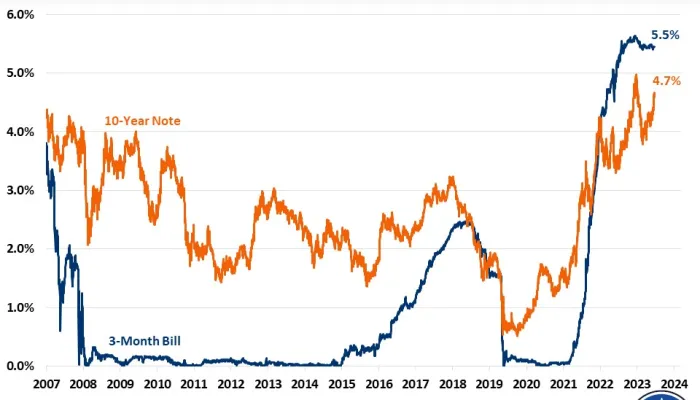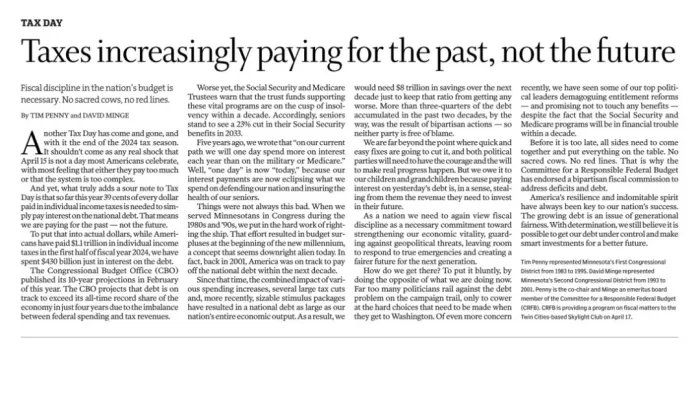Robert L. Bixby and Maya MacGuineas: Campaigns must focus on debt before all else
Robert L. Bixby, executive director of the Concord Coalition, and Maya MacGuineas, president of the Committee for a Responsible Federal Budget and head of the Campaign to Fix the Debt, wrote a commentary (paywall) that appeared in the Nashua Telegraph this past weekend. It is reposted here.
The next president will face an array of pressing issues. One issue, however, transcends them all: the unsustainable projected growth of the federal debt. No candidate's vision of the future, regardless of party or ideology, will be credible if it rests on the premise of more and more government borrowing.
Because annual deficits have dropped in recent years as the economy recovered from the Great Recession, candidates and voters may be tempted to conclude that our fiscal problems are behind us. That would be a mistake.
Deficits are projected to begin rising again as the next president takes office. Over the coming decade, the debt is on track to grow by more than $7 trillion and continue rising ever higher after that.
So we need to hear far more from the candidates in both parties about how they would shift the federal budget onto a more responsible path - one that would strengthen our nation and protect our children and grandchildren from inheriting a massive burden of government debt.
The debt is already at a post-World War II high as a share of the economy (GDP). It has grown from 35 percent of GDP in 2007 - about the post-World War II average - to 74 percent today, and is projected to exceed the entire economy by 2039.
While incremental progress is possible over the next year, it is very unlikely that Washington will undertake a major initiative to improve the budget's unsustainable path. The next opportunity for such an initiative will likely be the first budget of the next president.
It is therefore important for the 2016 presidential candidates to ensure that their politically appealing promises - including any new spending or lower taxes - fit within a sustainable budget. It is also essential for voters and the media to carefully scrutinize the candidates' fiscal proposals to determine whether they are realistic and responsible.
Having a sustainable fiscal vision should be important to all candidates no matter what their priorities, because a failure to address our fiscal outlook will limit a president's ability to meet other critical national challenges.
Too often a false choice is posed between addressing our fiscal challenges and growing the economy. In fact, they should be considered mutually supporting goals. Ever-rising federal debt will have negative ramifications for the economic well-being of all Americans. On the other hand, putting the debt on a sustainable long-term path would pay dividends in the future for jobs, wages, opportunity and growth.
Economic growth is crucial but alone can't solve the debt problem. A central cause of projected deficit growth and rising debt is a built-in mismatch between projected revenues and popular benefit programs that operate on autopilot, especially Medicare, Medicaid and Social Security.
Those three programs already comprise 47 percent of the budget. As the population ages and per-person health care costs continue to rise, these important programs will steadily become more expensive. Designated revenues for them, already well below the costs, are projected to fall farther and farther behind.
Rising deficits, along with expected interest rate increases, will also increase interest costs on the debt. The CBO projects that interest costs will become the fastest growing expense over the next two presidential terms, digging the hole deeper.
Government revenues, while already above their historical average, are projected to grow, but not by enough to keep up. Moreover, many Americans have become accustomed to huge tax-code subsidies for everything from home mortgage payments to employer-provided health care benefits. In total, these "tax expenditures," which are essentially spending programs in disguise, amount to more than $1 trillion per year.
Voters have a right and a responsibility to find out what the candidates are prepared to do about the debt problem in their first budget as president.
At a minimum, candidates should:
- Acknowledge that the long-term debt is a serious problem.
- Make addressing the debt a top priority in their campaigns.
- Put forward a plan for what they would do, rather than simply saying what they wouldn't do.
- Explain how they would pay for their initiatives.
- Use their speeches, white papers, press briefings and party platforms to engage and educate the public about the tough choices that need to be made.
We believe that New Hampshire citizens are willing to be part of sensible reforms that would help control the debt and grow the economy. To do so, however, they must make sure their own expectations of government are realistic, take a skeptical attitude towards pie-in-the-sky political promises, and support only those presidential candidates who are willing to honestly discuss and tackle the nation's difficult budget challenges.
"My Views" are works published by members of the Committee for a Responsible Federal Budget, but they do not necessarily reflect the views of all members of the Committee.


